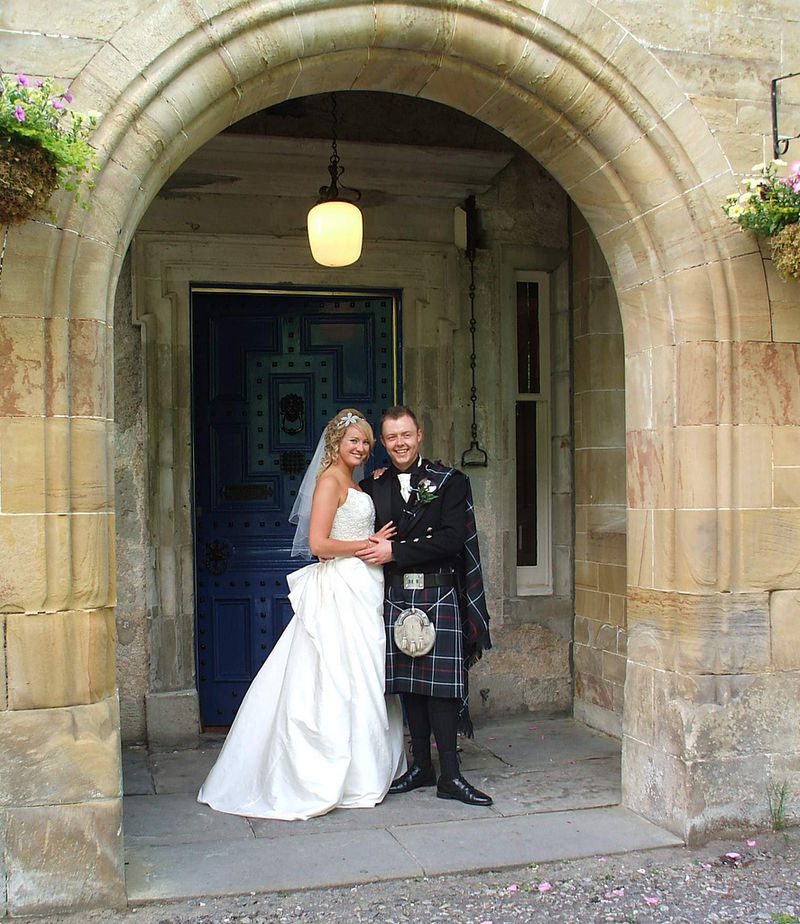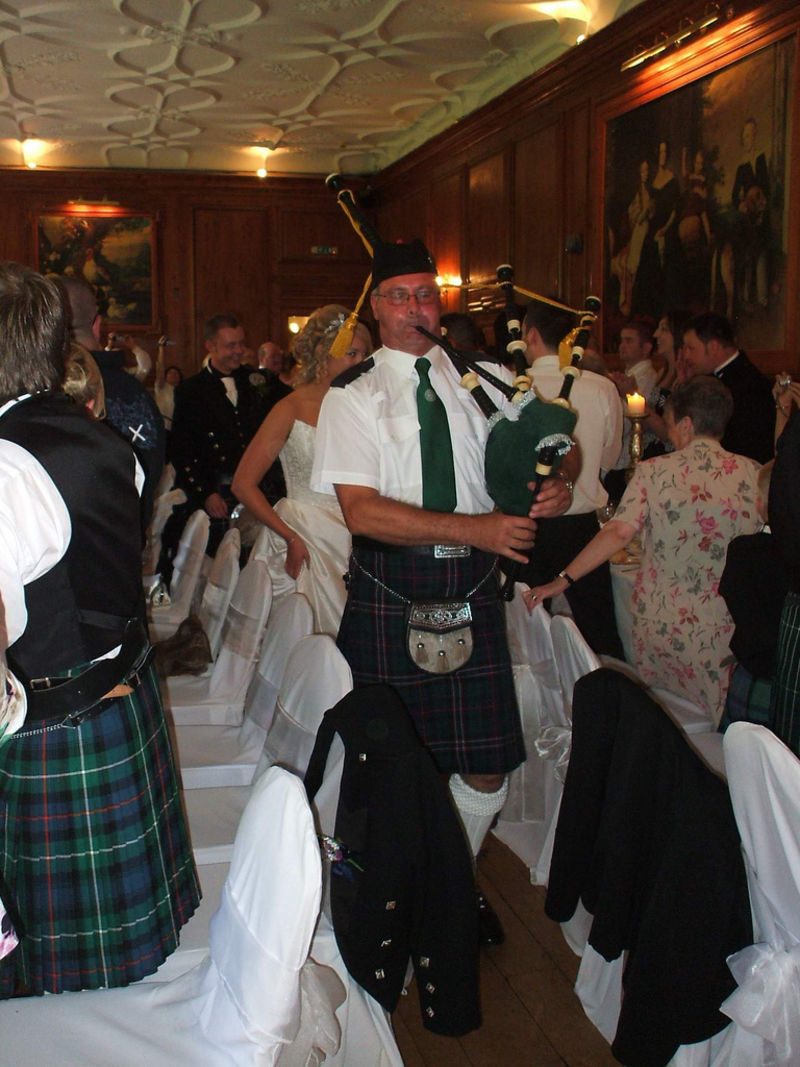Scottish Wedding
Scottish weddings blend modern practices with rich traditions, including the exchange of engagement rings and the gifting of a "luckenbooth" brooch for good luck, along with unique customs like the "blackening" of the groom and the bride wearing her clan's ribbon and a sixpence in her shoe. The ceremony can involve "creeling" for good luck, and after exchanging rings and vows, the reception features traditional Scottish dances, bagpipe music, and the sharing of whisky from a Quaich. Celebrations culminate with the song "Auld Lang Syne," highlighting the deep cultural heritage and communal spirit of Scottish weddings.
Scottish Wedding
A Scottish engagement is a matter of the heart. Still family ties and the clan stuff often influence the whole thing. Nowadays two people exchange the engagement rings. But traditionally a man should give a special present to his bride-to-be. This present is a silver brooch called the "luckenbooth".
It was named after the neighbourhood next to the St. Giles church in Edinburgh. In the late 17th and 18th century local goldsmiths had their businesses there. The "luckenbooth" consists of two hearts and a crown above them. This brooch should bring good luck if pinned to the blanket of the firstborn child.
A wild carrot or the Queen Anne's Lace once symbolized abundance. There used to be a tradition according to which on the Sunday before the St. Michel's Day (the 29th September) a groom-to-be has to give his bride-to-be some carrots tied together with a red ribbon.
Time of wedding is often subject to many prejudices. Some Scots believe that it is a bad luck to get married in May. There is a proverb saying "Marry in May and rue the day". Even the weather on the wedding day is believed to have some meaning. There are people who believe that rain on the wedding day means that the couple will have many children.
Not all Scottish men want to organize the stag party. It is because the party in some parts of Scotland includes something what is called "blackening". What is the procedure? A mixture made of soot, treacle, flour and feathers is put on the groom-to-be. After that he and his buddies walk through the neighbourhood.
Blackening is not part of the Scottish hen parties. But, as often in life, there is an exception. In the council area of Aberdeenshire located in the East of Scotland women are included in the blackening.

A bride in Scotland wears a white wedding dress. When her family believes in the tradition of Scottish clans she also wears a ribbon with the pattern of her family clan. She carries some white roses. An extra flower is often added for luck. It is heather (calluna).
Some Scots in Aberdeenshire and Angus believe that a bride should put a sixpence coin in her shoe for luck. Having luck in the future life is the reason why an old married woman should wash and dry bride's feet. In some parts of Scotland washing of bride's feet had let's say second stage where her feet were covered with soot or black shoe polish.
A groom is dressed in a "kilt". There is also a "sporran" (in Scottish Gaelic "purse") that is tied around the waist. His shirt or "sark" is traditionally bought by the bride. In return he buys her the wedding dress.
The wedding ceremony is held in the local register office or in a church. The bride arrives in a bridal car. When she enters the car her dad traditionally throws some coins for the children to pick. This is known as "scramble". With his action he expresses his hope that his daughter will have a financially secure life in the future.
During either civil or religious ceremony the couple exchanges wedding rings. Off course a big kiss ends the ceremony. In the south of Scotland the newlyweds can not leave the church without performing so called "creeling". Two persons stand at the church entrance. They hold a basket tied to a ribbon set across the door. The couple should cut the ribbon and the basket falls on the ground. This is done for good luck and success in financial matters.
"Creeling" once existed as another tradition. A groom would carry a "creel" (basket) filled with stones through the village until his bride would come out of the house and kiss him.
Many of you know the expression "tie the knot" which means to get married. Still I do not believe that you knew that it has Scottish origin. In the past after the wedding after the wedding ceremony a piece of cloth was thorn off from bride's and groom's wedding clothes. Then a knot was made out of those pieces. This act symbolized the newly formed union of two families.
All sort of presents are given to the newlyweds. Still there are some traditional rules. A best man in the northeast of Scotland, for example, gives a clock. Scottish wedding would not be the same without whiskey. There is a tradition of filling the Scottish Quaich ("Loving Cup") with whiskey. The cup goes from guest to guest and everyone drinks a bit.
Orkney islands are located in the north of Scotland. Local weddings still include a special drink which a mixture of beer, wiskey, gin, sugar and pepper. It is drank from a wooden cup ("cog"). The bride drinks it first and other guests follow.

The wedding reception starts with a Scottish wedding march. It is a reel type of dance. This kind of procession is lead by the newlyweds.
Almost all Scottish weddings include musicians performing on bagpipes. One of traditional dances that can be seen at many wedding receptions is the "lang reel". This dance is especially popular in communities in the northeast of Scotland.
The wedding reception ends with a song "Auld Lang Syne". Everyone is singing and dancing. Lyrics for this song is actually a poem written in 1788 by the famous Scottish writer Robert Burns (1759-1796).
References
Scottish Wedding Traditions
http://www.worldweddingtraditions.net/category/scotland/
Sporran
http://en.wikipedia.org/wiki/Sporran
Scottish Wedding Traditions
http://www.visitscotland.com/see-do/weddings/traditions/
Prenuptial Ceremonies & Traditions
http://www.scottish-wedding-dreams.com/prenuptial-ceremonies.html
Wedding Day Customs
http://www.scottish-wedding-dreams.com/wedding-day-customs.html
Scottish Wedding Traditions
http://flyawaybride.com/scottish-wedding-traditions/
Scottish Wedding Customs
http://scottish-weddings.scotclans.com/scottish_weddings/coortin2.html
10 Scottish Wedding Traditions You Should Know
http://whenonearth.net/10-scottish-wedding-traditions-know/
Nicole Kidder, Traditional Scottish Wedding Dances
http://weddingtraditions.about.com/od/ReceptionRituals/a/Traditional-Scottish-Wedding-Dances.htm
Image(s)
Scottish newlyweds (photo by Dave Conner, Flickr)
https://www.flickr.com/photos/conner395/2641620573/in/photostream/
Scottish wedding reception (photo by Dave Conner, Flickr)
https://www.flickr.com/photos/conner395/2644031762/in/photostream/
Creative Commons - File:Edinburgh Castle Rock.jpg